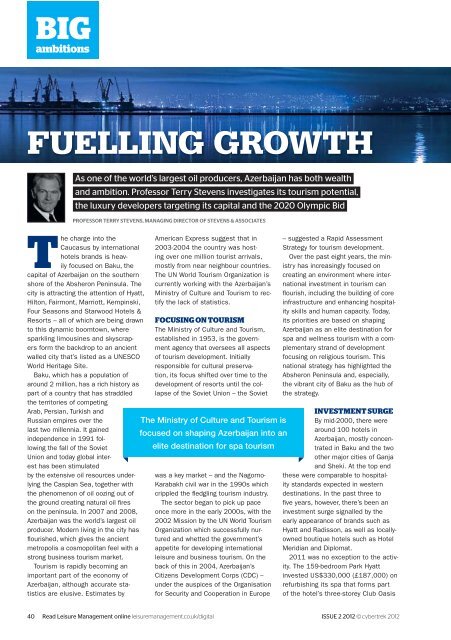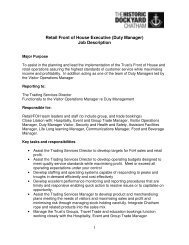sporting - Leisure Opportunities
sporting - Leisure Opportunities
sporting - Leisure Opportunities
You also want an ePaper? Increase the reach of your titles
YUMPU automatically turns print PDFs into web optimized ePapers that Google loves.
BIG<br />
ambitions<br />
FUELLING GROWTH<br />
As one of the world’s largest oil producers, Azerbaijan has both wealth<br />
and ambition. Professor Terry Stevens investigates its tourism potential,<br />
the luxury developers targeting its capital and the 2020 Olympic Bid<br />
he charge into the<br />
Caucasus by international<br />
hotels brands is heavily<br />
focused on Baku, the T<br />
capital of Azerbaijan on the southern<br />
shore of the Absheron Peninsula. The<br />
city is attracting the attention of Hyatt,<br />
Hilton, Fairmont, Marriott, Kempinski,<br />
Four Seasons and Starwood Hotels &<br />
Resorts – all of which are being drawn<br />
to this dynamic boomtown, where<br />
sparkling limousines and skyscrapers<br />
form the backdrop to an ancient<br />
walled city that’s listed as a UNESCO<br />
World Heritage Site.<br />
Baku, which has a population of<br />
around 2 million, has a rich history as<br />
part of a country that has straddled<br />
the territories of competing<br />
Arab, Persian, Turkish and<br />
Russian empires over the<br />
last two millennia. It gained<br />
independence in 1991 following<br />
the fall of the Soviet<br />
Union and today global interest<br />
has been stimulated<br />
by the extensive oil resources underlying<br />
the Caspian Sea, together with<br />
the phenomenon of oil oozing out of<br />
the ground creating natural oil fires<br />
on the peninsula. In 2007 and 2008,<br />
Azerbaijan was the world’s largest oil<br />
producer. Modern living in the city has<br />
flourished, which gives the ancient<br />
metropolis a cosmopolitan feel with a<br />
strong business tourism market.<br />
Tourism is rapidly becoming an<br />
important part of the economy of<br />
Azerbaijan, although accurate statistics<br />
are elusive. Estimates by<br />
PROFESSOR TERRY STEVENS, MANAGING DIRECTOR OF STEVENS & ASSOCIATES<br />
American Express suggest that in<br />
2003-2004 the country was hosting<br />
over one million tourist arrivals,<br />
mostly from near neighbour countries.<br />
The UN World Tourism Organization is<br />
currently working with the Azerbaijan’s<br />
Ministry of Culture and Tourism to rectify<br />
the lack of statistics.<br />
FOCUSING ON TOURISM<br />
The Ministry of Culture and Tourism,<br />
established in 1953, is the government<br />
agency that oversees all aspects<br />
of tourism development. Initially<br />
responsible for cultural preservation,<br />
its focus shifted over time to the<br />
development of resorts until the collapse<br />
of the Soviet Union – the Soviet<br />
The Ministry of Culture and Tourism is<br />
focused on shaping Azerbaijan into an<br />
elite destination for spa tourism<br />
was a key market – and the Nagorno-<br />
Karabakh civil war in the 1990s which<br />
crippled the fledgling tourism industry.<br />
The sector began to pick up pace<br />
once more in the early 2000s, with the<br />
2002 Mission by the UN World Tourism<br />
Organization which successfully nurtured<br />
and whetted the government’s<br />
appetite for developing international<br />
leisure and business tourism. On the<br />
back of this in 2004, Azerbaijan’s<br />
Citizens Development Corps (CDC) –<br />
under the auspices of the Organisation<br />
for Security and Cooperation in Europe<br />
– suggested a Rapid Assessment<br />
Strategy for tourism development.<br />
Over the past eight years, the ministry<br />
has increasingly focused on<br />
creating an environment where international<br />
investment in tourism can<br />
flourish, including the building of core<br />
infrastructure and enhancing hospitality<br />
skills and human capacity. Today,<br />
its priorities are based on shaping<br />
Azerbaijan as an elite destination for<br />
spa and wellness tourism with a complementary<br />
strand of development<br />
focusing on religious tourism. This<br />
national strategy has highlighted the<br />
Absheron Peninsula and, especially,<br />
the vibrant city of Baku as the hub of<br />
the strategy.<br />
INVESTMENT SURGE<br />
By mid-2000, there were<br />
around 100 hotels in<br />
Azerbaijan, mostly concentrated<br />
in Baku and the two<br />
other major cities of Ganja<br />
and Sheki. At the top end<br />
these were comparable to hospitality<br />
standards expected in western<br />
destinations. In the past three to<br />
five years, however, there’s been an<br />
investment surge signalled by the<br />
early appearance of brands such as<br />
Hyatt and Radisson, as well as locallyowned<br />
boutique hotels such as Hotel<br />
Meridian and Diplomat.<br />
2011 was no exception to the activity.<br />
The 159-bedroom Park Hyatt<br />
invested US$330,000 (£187,000) on<br />
refurbishing its spa that forms part<br />
of the hotel’s three-storey Club Oasis<br />
40 Read <strong>Leisure</strong> Management online leisuremanagement.co.uk/digital ISSUE 2 2012 © cybertrek 2012
















